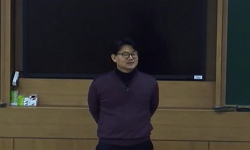Law is determinate when a question of law has a single right answer. In other words, indeterminate law does not constrain judicial decisions because it cannot lead to one conclusion. Indeterminacy in law has been an important issue as it is deemed to ...
http://chineseinput.net/에서 pinyin(병음)방식으로 중국어를 변환할 수 있습니다.
변환된 중국어를 복사하여 사용하시면 됩니다.
- 中文 을 입력하시려면 zhongwen을 입력하시고 space를누르시면됩니다.
- 北京 을 입력하시려면 beijing을 입력하시고 space를 누르시면 됩니다.
https://www.riss.kr/link?id=A101824301
- 저자
- 발행기관
- 학술지명
- 권호사항
-
발행연도
2009
-
작성언어
Korean
- 주제어
-
등재정보
KCI등재
-
자료형태
학술저널
-
수록면
371-409(39쪽)
-
KCI 피인용횟수
3
- DOI식별코드
- 제공처
- 소장기관
-
0
상세조회 -
0
다운로드
부가정보
다국어 초록 (Multilingual Abstract)

Law is determinate when a question of law has a single right answer. In other words, indeterminate law does not constrain judicial decisions because it cannot lead to one conclusion. Indeterminacy in law has been an important issue as it is deemed to damage the rule of law by allowing arbitrariness from judges and by diminishing legal stability. There are three existing theories about the relationship between indeterminacy and the rule of law: Firstly, critical legal theorists criticize the rule of law to be a fiction covering arbitrary use of power, considering indeterminacy of law. This stance thoroughly denies determinacy of law, so it cannot tell unlawful judgments from discretionary judgments. Secondly, Dworkin denies that the judicial discretion damages the rule of law, suggesting that law always has a right answer. According to his interpretive legal theory, political morality offers the standard to judge what the best interpretation is. However, considering that there can be a serious disagreement about moral judgment, this can lead to epistemological indeterminacy of law. Thirdly, legal positivists assert that indeterminacy and the rule of law are compatible although law is partially indeterminate. This argument is wrong in that it is based on a false premise that there are few indeterminate cases in law. Due to the indeterminacy in law, it seems to be impossible to achieve the ideal of the rule of law. In order to solve this contradiction, it is required to reconstitute the concept of the rule of law. Thus, when law is indeterminate, making final resolutions of legal disputes can be a requirement for the rule of law. From this stance, it is not inconsistent with the rule of law when a judge concludes a dispute based on his or her decision for indeterminate cases.
참고문헌 (Reference)
1 안성조, "괴델정리의 법이론적 함의" 법학연구소 49 (49): 683-731, 2008
2 조홍식, "勿輕視政治 - 比例立憲主義를 主唱하며 -" 법학연구소 49 (49): 97-126, 2008
3 Timothy Endicott, "Vagueness in Law" Oxford University Press 2000
4 William Edmundson, "Transparency and Indeterminacy in the Liberal Critique of Critical Legal Studies" 24 : 1993
5 Jeremy Waldron, "Theoretical Foundation of Liberalism" 34 (34): 1987
6 Joseph Singer, "The Player and the Cards: Nihilism and Legal Theory" 94 : 1984
7 Jeremy Waldron, "The Irrelevance of Moral Objectivity,in: Law and Disagreement" Clarendon Press 1999
8 Herbert Hart, "The Concept of Law" Oxford University Press 1994
9 Joseph Raz, "The Authority of Law" Clarendon Press 1979
10 Ronald Dworkin, "Taking Rights Seriously" Harvard University Press 1977
1 안성조, "괴델정리의 법이론적 함의" 법학연구소 49 (49): 683-731, 2008
2 조홍식, "勿輕視政治 - 比例立憲主義를 主唱하며 -" 법학연구소 49 (49): 97-126, 2008
3 Timothy Endicott, "Vagueness in Law" Oxford University Press 2000
4 William Edmundson, "Transparency and Indeterminacy in the Liberal Critique of Critical Legal Studies" 24 : 1993
5 Jeremy Waldron, "Theoretical Foundation of Liberalism" 34 (34): 1987
6 Joseph Singer, "The Player and the Cards: Nihilism and Legal Theory" 94 : 1984
7 Jeremy Waldron, "The Irrelevance of Moral Objectivity,in: Law and Disagreement" Clarendon Press 1999
8 Herbert Hart, "The Concept of Law" Oxford University Press 1994
9 Joseph Raz, "The Authority of Law" Clarendon Press 1979
10 Ronald Dworkin, "Taking Rights Seriously" Harvard University Press 1977
11 Stephen Guest, "Ronald Dworkin" Edinburgh University Press 1997
12 Brian Tamanaha, "On the Rule of Law" Cambridge University Press 2004
13 awrence Solum, "On the Indeterminacy Crisis: Critiquing Critical Dogma" 54 : 1987
14 Brian Leiter, "Objectivity,Morality,and Adjudication, in Objectivity in Law and Morality" Cambridge University Press 2001
15 Matthew Kramer, "Objectivity and the Rule of Law" Cambridge University Press 2007
16 Ken Kress, "Legal Indeterminacy" 77 : 1989
17 Ronald Dworkin, "Law’s Empire" Harvard University Press 1986
18 Ronald Dworkin, "Law, Philosophy and Interpretation" 80 : 1994
19 Jeremy Waldron, "Is the Rule of Law an Essentially Contested Concept (In Florida)?" 24 (24): 2002
20 rian Leiter, "Is There an ‘American’ Jurisprudence?" 74 : 2005
21 Ronald Dworkin, "Indeterminacy and Law" Positivism Today, Dartmouth Publishing 1996
22 Jules Coleman, "Determinacy, Objectivity and Authority, in Law and Interpretation" Oxford University Press 1995
23 Mark Tushnet, "Defending the Indeterminacy Thesis, in Analyzing Law: New Essays in Legal Theory" Oxford University Press 1998
24 Brian Leiter, "American Legal Realism, in Philosophy of Law and Legal Theory" Blackwell Publishing 2005
25 Ronald Dworkin, "A Matter of Principle" Harvard University Press 1985
동일학술지(권/호) 다른 논문
-
- 중앙법학회
- 김종천(Jong Cheon Kim)
- 2009
- KCI등재
-
- 중앙법학회
- 오세혁(Se Hyuk Oh)
- 2009
- KCI등재
-
- 중앙법학회
- 이달휴(Dhal Hugh Lee)
- 2009
- KCI등재
-
금융감독제도의 새로운 방향 모색에 대한 법·제도적 고찰
- 중앙법학회
- 최승필(Seung Pil Choi)
- 2009
- KCI등재
분석정보
인용정보 인용지수 설명보기
학술지 이력
| 연월일 | 이력구분 | 이력상세 | 등재구분 |
|---|---|---|---|
| 2026 | 평가예정 | 재인증평가 신청대상 (재인증) | |
| 2020-01-01 | 평가 | 등재학술지 유지 (재인증) |  |
| 2017-01-01 | 평가 | 등재학술지 유지 (계속평가) |  |
| 2013-01-01 | 평가 | 등재학술지 유지 (등재유지) |  |
| 2010-01-01 | 평가 | 등재학술지 유지 (등재유지) |  |
| 2008-01-01 | 평가 | 등재학술지 유지 (등재유지) |  |
| 2005-01-01 | 평가 | 등재학술지 선정 (등재후보2차) |  |
| 2004-01-01 | 평가 | 등재후보 1차 PASS (등재후보1차) |  |
| 2003-01-01 | 평가 | 등재후보학술지 선정 (신규평가) |  |
학술지 인용정보
| 기준연도 | WOS-KCI 통합IF(2년) | KCIF(2년) | KCIF(3년) |
|---|---|---|---|
| 2016 | 0.69 | 0.69 | 0.62 |
| KCIF(4년) | KCIF(5년) | 중심성지수(3년) | 즉시성지수 |
| 0.6 | 0.55 | 0.818 | 0.23 |




 KCI
KCI DBpia
DBpia







